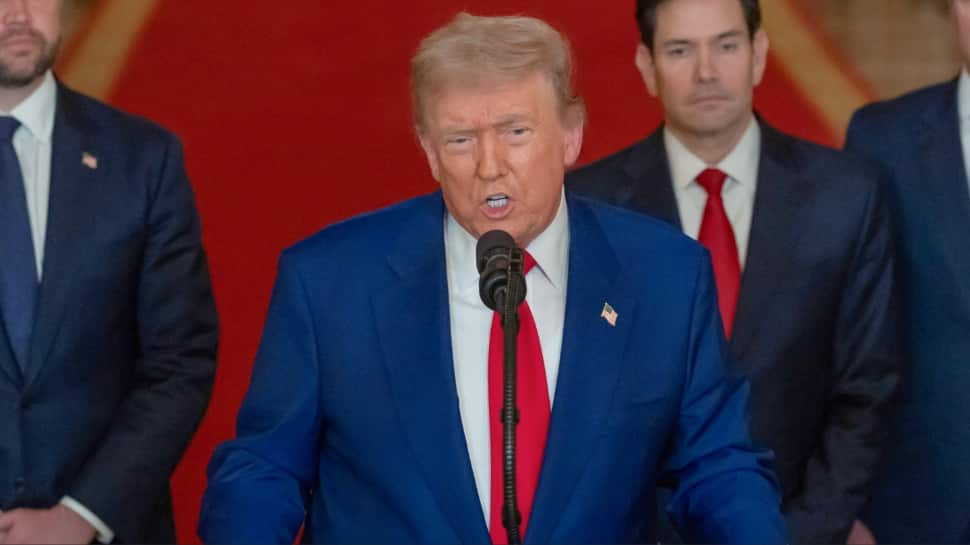A ‘Win-Win’ For Trump? How US President Takes Credit For Iran-Israel Truce | World News

Following 12 days of fierce fighting, a “full and complete ceasefire” has been announced between Iran and Israel by US President Donald Trump. The end to the war comes as a war threatened to engulf much of the world, with President Trump praising it as a triumph for the “endurance, courage, and wisdom” of both countries. Trump highlighted that this ceasefire is a win-win for Iran, Israel, and the United States because it tactically meets the fundamental interests of each side.
How Israel Benefits From The Ceasefire
Relieving Nuclear Threats: Israel’s main goal in the war was crippling Iran’s nuclear program. Bombings conducted since June 13 against main nuclear facilities such as Fordow, Natanz, and Isfahan have, by satellite images and US reports, pushed back Iran’s nuclear program by several years. Bunker-buster bombings by US B-2 bombers further destroyed the infrastructure of these installations, a great strategic win that instantaneously puts Iran’s nuclear ambitions in check.
Reasserting Regional Dominance: The 12-day war enabled Israel to re-prove its leadership and military prowess superiority in West Asia. Its F-35I stealth fighters and advanced missile defense systems (Iron Dome, Arrow-3) caused devastating losses to Iran, demonstrating its unmatched military strength in the region. While some Iranian violations, Israel’s missile defense systems demonstrated maximum effectiveness, greatly reducing casualties on their side (approximately 30 deaths as opposed to almost 1,000 for Iran). This bolstered Israel’s defense credibility in the world.
Intelligence Capability: The conflict also reaffirmed Mossad’s image of stealth operations, with reports indicating that a number of early Israeli strikes came from deep within Iran itself, demonstrating high-level penetration.
Civilian and Economic Security Protection: With the progress of the war, Israel’s weaknesses came to light. Iranian hypersonic missiles started infiltrating Israeli territory effortlessly, causing civilian fatalities and city damage in the likes of Tel Aviv, Jerusalem, and Beer Sheva via cluster bomb strikes. Accepting the ceasefire helped Israel avoid further civilian and economic losses.
Iran’s Strategic Advantages Of The Ceasefire
“Rally Around the Flag” Effect: The war initially created a “rally around the flag” effect in Iran, enhancing popular support for Supreme Leader Ayatollah Ali Khamenei and the Islamic Revolutionary Guard Corps (IRGC). The ceasefire maintains this support by averting a long war that could further have stretched the economy and public endurance of Iran, a development already palpable with Tehran residents already fleeing.
Avoiding Additional Military And Civilian Losses: If fighting had continued, Iran would have risked even heavier losses. Its missile defenses were all but useless against Israeli jets as well as American B-2 bombers and contributed to the early loss of air superiority. The ceasefire prevented additional humiliation along this axis.
Displaying Military Capabilities: Iran indicated its retaliatory capability via missile and drone attacks on Israel and the US Al Udeid Air Base in Qatar. The offensive against the American air base prior to the ceasefire enabled Iran to save face, showing its missile capabilities within the Middle East without risking a lethal US retaliation that an extended conflict would have attracted. The ceasefire offers Iran a chance to reorganize its military and diplomatic positioning, particularly with the help of allies such as Russia and China.
Why The Ceasefire Serves The United States
Trump’s Diplomatic Win: President Trump can add another major diplomatic win to his list of accomplishments, this ceasefire included, just like his contribution in softening the India-Pakistan conflict. This reinforces his home and international reputation, with his cooperation with Qatari Emir Sheikh Tamim bin Hamad Al Thani and Israeli Prime Minister Benjamin Netanyahu proving his mediation capabilities. The ceasefire is also consistent with Trump’s policy of not engaging US forces directly in foreign wars.
Reining in Iran’s Nuclear Program: Iran’s nuclear program has long been a source of concern to the US. The US airstrikes on the eve of the ceasefire dealt Iran’s nuclear program a devastating blow, at Fordow, Isfahan, and Natanz. Having successfully carried out its mission, the US curtailed its engagement, averting a more protracted war that would have exacerbated regional instability and placed greater burdens on US military resources.
Regional Security And Oil Supplies: The conflict pushed oil prices to over USD 100 per barrel, putting pressure on the US economy. The quick ceasefire stabilised oil supplies, with promises of higher production from allies such as Saudi Arabia and UAE. This was economically and strategically critical for the US, particularly by preventing any possible Iranian closure of the Strait of Hormuz. The ceasefire avoided a broader regional conflict, protecting US military bases and interests.
The Iran-Israel war, if it had lasted, threatened catastrophic consequences: economic and civilian losses for Israel, survival threats to Iran’s government and economy, and regional tensions and oil emergencies for the US. The ceasefire avoided these threats, precluding broader repercussions, such as possible Russian or Chinese intervention. Qatar’s role was essential in enabling all sides to “save face” and “feel pride” over their respective accomplishments. Israel managed the nuclear threat, Iran showcased retaliatory capability, and the US displayed diplomatic leadership.







